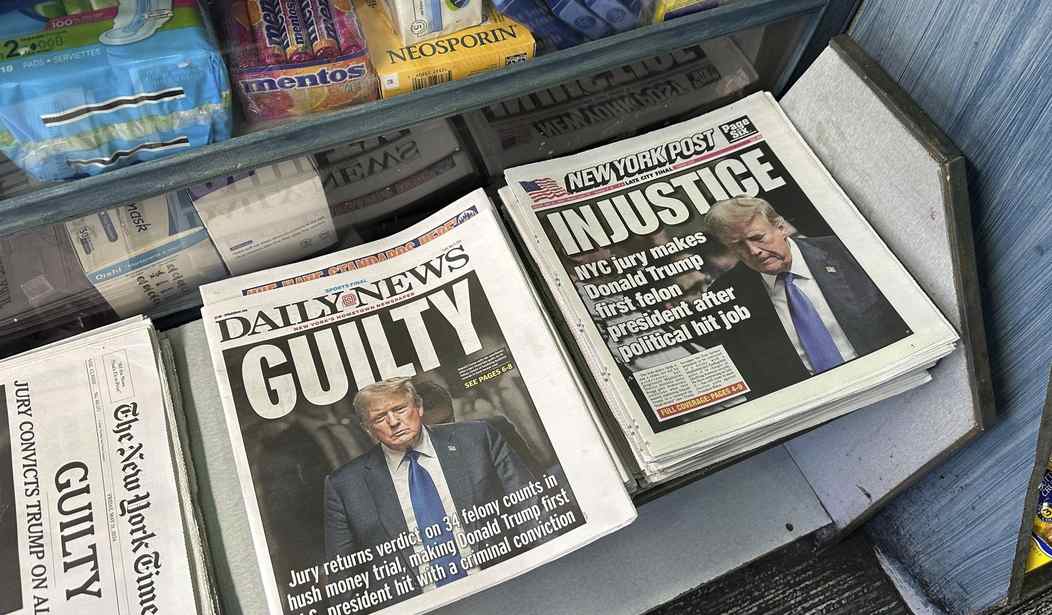Conservatives have been pointing out the blatant bias that resulted in Donald Trump getting indicted, tried, and convicted in a kangaroo court on Thursday, but when a CNN legal analyst says the same thing, it's a big deal. In an article for New York magazine, Elie Honig accused prosecutors of contorting the law to rig the trial against Trump.
"The jury did its job," Honig wrote, but added that the case against Trump "was an ill-conceived, unjustified mess."
Honig pointed out several concerning aspects regarding the impartiality and legal soundness of the case involving Trump, which many on the right have pointed out plenty of times. First, Judge Juan Merchan was a Biden donor, which is against the rules for New York judges. He also exposed his own personal bias — a bias that he proved repeatedly over the course of the trial. Second, he pointed out that District Attorney Alvin Bragg ran for his position on the platform of getting Trump.
Related: Donald Trump Raises a Jaw-Dropping Amount of Campaign Cash After Bogus Verdict
"Most importantly, the DA’s charges against Trump push the outer boundaries of the law and due process," Honig continued. "That’s not on the jury. That’s on the prosecutors who chose to bring the case and the judge who let it play out as it did."
The district attorney’s press office and its flaks often proclaim that falsification of business records charges are “commonplace” and, indeed, the office’s “bread and butter.” That’s true only if you draw definitional lines so broad as to render them meaningless. Of course the DA charges falsification quite frequently; virtually any fraud case involves some sort of fake documentation.
But when you impose meaningful search parameters, the truth emerges: The charges against Trump are obscure, and nearly entirely unprecedented. In fact, no state prosecutor — in New York, or Wyoming, or anywhere — has ever charged federal election laws as a direct or predicate state crime, against anyone, for anything. None. Ever. Even putting aside the specifics of election law, the Manhattan DA itself almost never brings any case in which falsification of business records is the only charge. [Emphasis mine]
Honig continued, "Standing alone, falsification charges would have been mere misdemeanors under New York law, which posed two problems for the DA. First, nobody cares about a misdemeanor, and it would be laughable to bring the first-ever charge against a former president for a trifling offense that falls within the same technical criminal classification as shoplifting a Snapple and a bag of Cheetos from a bodega. Second, the statute of limitations on a misdemeanor — two years — likely has long expired on Trump’s conduct, which dates to 2016 and 2017."
So, to inflate the charges up to the lowest-level felony (Class E, on a scale of Class A through E) — and to electroshock them back to life within the longer felony statute of limitations — the DA alleged that the falsification of business records was committed “with intent to commit another crime.” Here, according to prosecutors, the “another crime” is a New York State election-law violation, which in turn incorporates three separate “unlawful means”: federal campaign crimes, tax crimes, and falsification of still more documents. Inexcusably, the DA refused to specify what those unlawful means actually were — and the judge declined to force them to pony up — until right before closing arguments. So much for the constitutional obligation to provide notice to the defendant of the accusations against him in advance of trial. (This, folks, is what indictments are for.)
In these key respects, the charges against Trump aren’t just unusual. They’re bespoke, seemingly crafted individually for the former president and nobody else.
Remember, this is a legal analyst from CNN saying this.










Join the conversation as a VIP Member